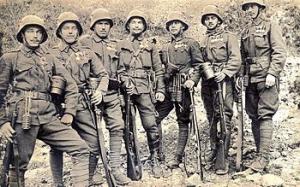
Both sides this month prepared for the offensives which were to come. The armistice with Russia and the prolonged, bitter negotiations culminating in the imminent Brest-Litovsk Treaty enabled Germany to transfer troops from the Eastern Front giving them a brief superiority in the war.
Leaving behind second rate infantry to garrison the enormous territories conceded by the Bolsheviks, the German brought 44 elite divisions to France and Belgium. Determined to strike before the Americans could introduce their vast manpower and resources to bear, they practised in secret the techniques that had proved so successful at Riga and Caporetto. Amassing over half of their heavy guns against the British and using Bruchmuller's proven technique of horrendous, concentrated and varied artillery just 6 hours prior to an assault they aimed to deploy highly trained, well equipped "stormtroopers". Equipped with submachine guns, trench mortars and flame throwers they were expected to achieve the breakthrough that so far had eluded everyone on the Western Front.
Lloyd George, appalled by the terrible casualties at Passchendaele and Cambrai, held back many thousands of replacements in Britain. This was unfortunate because it came at the moment when we had to take over a further 25 miles of front from the French in the old Somme battlefields. We had also just begun a process of reorganisation reducing the strength of divisions from 12 battalions to 9.
Put simply we were running short of men. The Cabinet estimated we would need 620,000 in 1918 simply to make good our losses, but we had only 100,000 available despite conscription. A quarter of our battalions (there were 800 - 1,000 in a complete unit) were to leave their division and move to unfamiliar commanders and groups. Morale thus sunk low in many units. What was worse, unknown to us, the enemy was planning to attack Gough's battle-weary, under-strength and over-stretched 5th Army near St Quentin. Haig had decided to leave the bulk of his forces further north in Flanders and north of Arras to protect the Channel ports. Never known for outstanding efficiency, Gough was to lead an army that was to face near destruction in the weeks to come.
As there were no major offensives in February itself we suffered no fatalities in the battle zones. Sadly, however, we were to lose one young man who was to die at home. Private John Charles Bell passed away on the 20th. He was a member of the 540th Home Service Employment Company of the Labour Corps (497737). This corps was made up of men who were deemed unfit for active service but who performed important duties in servicing military bases and establishments like hospitals here and across the Channel. They carried out basic labouring tasks such as construction, maintenance and clerical duties. John, born in 1887 in Hulme, was in 1911 employed as a butler at Alleston Tower, the home of the calico print owner, Charles J Caulfield. John is remembered on the Wilmslow war memorial and is interred in Alderley Edge graveyard.
The community must have been relatively glad that we lost only one young man this month - in March we were to be devastated by 19 deaths.
Guest post by Jon Armstrong and Alan Cooper, Wilmslow Historical Society, with a contribution from Michael Scaife.










Comments
Here's what readers have had to say so far. Why not add your thoughts below.
What a pity that the British Red Cross Corporation considers the War Memorial in Knutsford a prime target for demolition!
The highly paid Executives at the British Red Cross state that they need the funds that they seek to acquire from their redevelopment sale project "for other purposes".
I suggest that the British Red Cross should apply to the German Government to be awarded
a delayed Iron Cross to them, for the total disrespect they show for those who paid the ultimate price defending our freedom in Britain.
Red cross should hang their heads....(I was going to add 'in shame' but perhaps they are incapable).